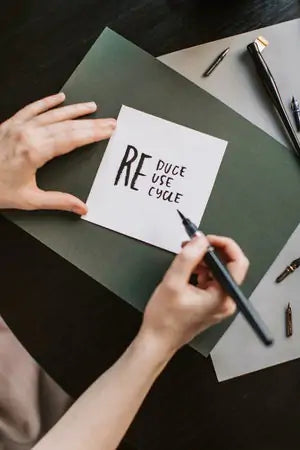Your basket is currently empty.
Shop NowWhy It’s Important to Reduce, Reuse, Recycle

Reduce, reuse, recycle. It’s more than a mantra, it’s what we need to do to slow down the frightening pace of climate change.
The recent IPCC report on climate change was a ‘code red for humanity.’ It stated that human activity is changing the climate in unprecedented and sometimes irreversible ways. It warned of the impact of doing nothing, from extreme heat waves to droughts and flooding. But it also offered some hope. If we cut greenhouse gas emissions, it could stabilise global temperatures. But we have to act now.
The need to send less waste to landfill
It’s so important to reduce, reuse, recycle because any waste we don’t recycle ends up on landfill sites. When waste rots, it gives off methane. Methane is one of the greenhouse gases that contribute to climate change. Another reason we should reduce the amount of waste we send to landfills is that we’re simply running out of landfill space.
Reduce, reuse, recycle: Changing our habits
Think of ‘reduce, reuse, recycle’ as the hierarchy of reducing your environmental impact. Reducing waste is the best option, followed by reusing and recycling items wherever you can.
Reducing waste
Reducing waste in the first place saves energy, precious resources, and raw materials. Examples of how you could reduce waste could include things like:
Saving energy by not leaving appliances on standby;
Turning off the tap when you brush your teeth to save water;
Putting your food waste onto a compost heap instead of in the bin.
We can all make a difference when it comes to reducing waste. Some of the UK’s biggest companies have been getting on the reduce, reuse, recycle bandwagon too. Aldi, Asda, Lidl, Sainsbury’s, Morrisons, Waitrose, and Tesco have signed up to the UK Plastics Pact and committed to reducing plastic waste. Iceland has pledged to remove plastic packaging from all its own-brand products by 2023.
Reusing items
There has been a huge drive to encourage us to ditch single-use items in recent years. The government has banned plastic straws, cotton buds, and drink stirrers. We strive to fill up our reusable water bottles and take our reusable coffee cups to Starbucks. All for good reason.
The more items we reuse, the more energy we save and less precious resources end up in landfills. It can be as simple as using old glass jars for storage, or as creative as turning that old bedside table into something unique. Reusing is an integral part of reduce, reuse, recycle!
Recycling
Ah, recycling. So confusing, but so crucial. It might seem annoying to have to meticulously sort your glass, cans, and plastic. However, it’s important that you do. You can recycle materials like glass and aluminium indefinitely and turn them into brand new products. It takes less energy and resources to make an item from recycled materials than it does to make something brand new.
While recycling is not a seamless process by far, it’s pretty genius. Those water bottles you recycle can end up as garden furniture or clothing. Glass becomes new bottles or jars. And that Diet Coke can? It's recycled and back on your supermarket shelf in as little as two months!
So don’t roll your eyes when you hear ‘reduce, reuse, recycle’ because it’s more than worth it. We can all make a difference and slow down the pace of climate change, one aluminium can at a time.
For more interesting articles and tips on all things recycling, check out the rest of our blog.






